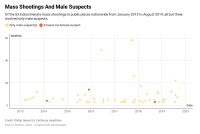Latest KFF Health News Stories
Vaping-Related Lung Damage Resembles Chemical Burn
Mayo Clinic researchers found this pattern in a study of 17 lung bioposies from patients from across the country who have suffered the mysterious lung injury. Researchers also found that the problems were less likely to be caused by fatty substances such as mineral oils. Other news outlets report on the question of what happens when people who vape or use e-cigarettes can no longer buy them.
A new report released by the National Center for Health Statistics on Thursday shows that the twin birthrate fell 4 percent from 2014 to 2018. The decrease occurred in only white women and women 30 or older, the biggest customers of expensive in vitro fertilization treatments, which are involved in roughly 15 percent of multiple births. A shift in the technology is probably leading to one-baby births, experts say.
Federal Judge Boosts The Position Of Supervised Injection Sites
The judge’s ruling in this case could have far-reaching implications for other jurisdictions interested in setting up such sites. The Justice Department, which filed the initial lawsuit against Philadelphia-based Safehouse, vowed to continue efforts to block other cities from opening injection sites, which its lawyers have argued are illegal.
Purdue, and members of the family that owns it, are pursuing a settlement to end more than 2,600 federal lawsuits and hundreds more in state courts.
Sen. Bernie Sanders Has Stents Inserted To Treat Heart Blockage, Postpones Campaign Events
Aides said the senator, who is a candidate for the Democratic presidential nomination, is in good spirits. The procedure is common and generally requires only a short recovery.
Trump Expected To Unveil Today Initiative To Expand Medicare Advantage Plans
The president reportedly will sign an executive order that the White House hopes will be a potent way to compare Republican views about enhancing health care with the “Medicare for All” proposals endorsed by some Democratic presidential candidates.
First Edition: October 3, 2019
Today’s early morning highlights from the major news organizations.
Tenn. Block Grant Experiment Would Boost Federal Funding, State Medicaid Chief Says
In a Q&A with Kaiser Health News, Tennessee Medicaid Director Gabe Roberts says state officials are requesting a modified block grant from federal officials because it would save money and allow the state to keep some of that savings.
When Masculinity Turns ‘Toxic’: A Gender Profile Of Mass Shootings
Men are far more likely than women to commit deadly mass shootings, both in California and across the nation. We break down the numbers — and ask experts why gender would have a role in indiscriminate violence.
Walmart To Give Workers Financial Incentives To Use Higher-Quality Doctors
The program, which will roll out next year in three parts of the country, seeks to encourage workers on the company’s health plan to choose doctors that have been identified as providing “appropriate, effective and cost-efficient care.”
Cirugías estéticas y el mundo secreto de las “muñecas de Instagram”
Se llaman a sí mismas muñecas. Son pacientes de cirugía estética que documentan sus deseos y resultados en Instagram. Una comunidad cerrada con mensajes médicos, pero también marketing.
Brechas profundas: fronteras estatales resaltan la enorme disparidad en Medicaid
Las fronteras estatales se han convertido en líneas divisorias arbitrarias entre los que tienen Medicaid y los que no, y los pacientes con problemas financieros similares enfrentan destinos de salud muy diferentes.
Opinion writers weigh in on these health issues and others.
Media outlets report on news from North Carolina, California, Tennessee, Georgia, Ohio, Michigan, Massachusetts, Iowa, Minnesota and West Virginia.
Georgia’s 6-Week Abortion Ban Temporarily Blocked By Federal Judge
U.S. District Judge Steve Jones ruled that Georgia’s law banning abortion once there is a “detectable human heartbeat” — which can be as early as 6 weeks and before a woman knows she is pregnant — won’t go into effect on Jan. 1. News on state abortion restrictions also comes from Ohio, Kansas and Virginia.
Medicaid Expansion Remains A Primary Sticking Point In North Carolina Budget Stalemate
North Carolina’s Republican-led state legislature plans to adjourn by Oct. 31, with or without an approved budget. Earlier in the summer, Gov. Roy Cooper vetoed a budget bill, in part because it did not include Medicaid expansion. In Florida, state Medicaid officials recommend cuts to its program for people with disabilities, though the caps were not as severe as some had initially feared. And in other state budget news, Michigan Gov. Gretchen Whitmer defends her line-item vetoes.
The most lucrative of the schemes prosecutors described Tuesday centered on solicitation of $240 million in medically unnecessary cancer genetic tests. In other news, a Texas woman is charged with defrauding the VA of $640,000.
Microsoft To Work With Novartis On Applying Artificial Intelligence To Business, Health Care Issues
Part of the work will focus on using deep learning — the technique that has brought the biggest recent advances in AI — to improve development of new medicines, the Los Angeles Times reports. Also in industry news: new technology for pictures of the heart, Biogen announces a new R&D chief, Bayer appoints a prominent agricultural expert to its board, and a primer on the problems that led drug stores to pull Zantac from the shelves.
Study Finds Surprising Increase In Heart Valve Infections For Hospitalized Patients
The study showed hospital-acquired heart valve infections have increased as the number of community-acquired heart valve infections have declined. Meanwhile, news outlets report on the recent penalties levied on hospitals with high rates of readmissions and new data looking at hospitals’ lowered profitability.
KQED News reached out to listeners on Twitter to ask them how they were dealing with climate news. One person tweeted “It’s an ever-present anxiety that grows and recedes but never leaves. Sometimes it’s a dull ache that gnaws at the present moment, and sometimes it’s acute and all-consuming.” Public health news is on the downside of hysterectomies, physical fitness benefits for young adults, meat’s comeback, and a potential cure for sepsis, as well.







